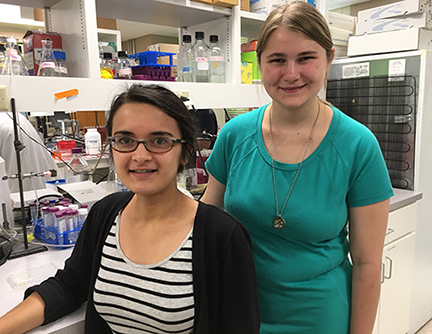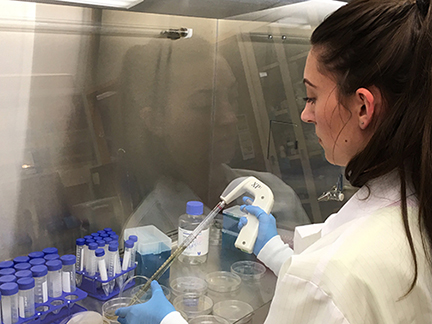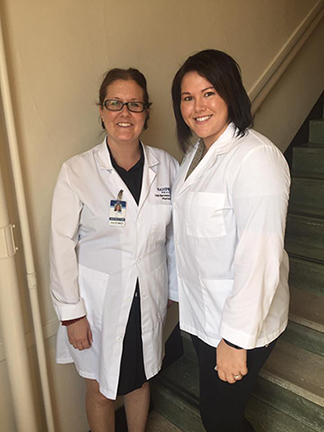September 7, 2016 – Fargo, North Dakota – From research to create new medications to developing proteins that could fight skin infections, undergraduate and graduate students in the College of Health Professions have opportunities for hands-on learning in the labs of Sudro Hall. Others take advantage of opportunities outside the lab.
Students Kayla Heier, Arianna Vidger and Emily Olig spent their summer working in research labs, while Jenna Gullickson was immersed in breast cancer research, presenting findings at a national conference.

Seeking new ways to treat skin infections
The lab of Dr. Stefan Vetter in pharmaceutical sciences presented a unique opportunity for first year pharmacy student Kayla Heier.
“I have always been interested in the research side of pharmacy, and I wanted to get some hands-on experience with it before making any more choices about my schooling and classes,” said the Perham, Minnesota native.
“My area of focus is on a small protein that is part of the human body's innate immune system. It is released by white blood cells as part of inflammation, and binds metals to help keep them away from invading organisms,” explained Heier.
Dr. Vetter developed a variant of a human protein with antimicrobial properties that could lead to novel treatments for skin infections and expand the range of topical antimicrobials available. The discovery led to an opportunity for Heier.
“We have been working on making this protein ourselves by growing it in bacterial cells, and the majority of my work has been focused on testing if our manufactured protein behaves in the same way as the natural protein in the human body,” said Heier. “Part of my study is to see if this protein will work as an effective topical antibiotic.”
While the summer research experience was her first time working in a lab, Heier said it was a positive one. “This experience has definitely helped me see that I enjoy lab work, and that I may want to continue working in a lab in the future.”
Heier plans to work in the field of pharmacy in a hospital or emergency room.

Treating chronic bone infections
In the lab of Dr. Amanda Brooks, second-year medical student Emily Olig found opportunity.
“As a medical student, it is really beneficial for our applications to residency when we have research experience and publications. It shows many teaching hospitals that we value research and understand how to pursue it,” said Olig.
Research in the Brooks lab includes chronic osteomyelitis in military veterans who have experienced significant bone trauma. Researchers are using 3-D encapsulated cells to model a bone infection, and then deliver nanoparticle antibiotics directly to the cells in the model.
Olig studied the interactions between bacteria and bone cells. The Fargo native investigated how the interactions might be manipulated to prevent chronic bone infections that are extremely difficult to treat.
“There is an increasing occurrence of these types of chronic infections in orthopedic surgery and in amputees, such as in our veteran population. Preventing these infections from settling would improve long-term outcomes of many different orthopedic surgeries and improve quality of life for many people,” she said.
Working in the lab of Dr. Brooks also provided Olig an opportunity to learn how to approach research questions, and assess available information to ultimately decide what needs to be studied.
“After my experience at NDSU, I am driven to hone my researcher's point of view and pursue clinical research during my residency and beyond, in order to further benefit my patients,” Olig said.
Taking aim at pancreatic cancer
Until working in the lab of Dr. Estelle Leclerc in pharmaceutical sciences, second year pharmacy student Arianna Vidger had very little exposure to the research process.
Dr. Leclerc's lab is part of a research group working on pancreatic cancer. Vidger, from Fargo, conducted experiments to examine the role of a particular receptor on the growth of cancer cells.
“This receptor is present in higher than normal levels in many diseases, including pancreatic cancer,” said Vidger. “This kind of research will help scientists better understand how certain characteristics and structures of cancer cells contribute to the development of tumors. These structures may conceivably become targets of drugs and other therapies,” explained Vidger.
The long and often complex time frames needed to advance research surprised Vidger during her summer research experience.
“There are starts and stops, problems to be solved, mistakes that must be corrected, and time-consuming processes that may or may not give the expected results,” said Vidger. “I am thankful for deeper, more practical understanding of the research process that this experience has given me,” she said. “ I have learned a lot about the practical aspects of lab work, as well as experiment planning and analyzing results.”
Vidger will apply what she learned in her summer research experience on her future career path. She hopes to eventually work as a hospital pharmacist.

Presenting breast cancer research to a national audience
Third year pharmacy student Jenna Gullickson took a different approach in her summer research experience. She presented research at the Ronald E. McNair Scholars Symposium at the University of California Berkeley during summer break.
A native of Center, North Dakota, Gullickson worked with Dr. Lisa Narveson in pharmacy practice in the College of Health Professions. Gullickson reviewed research that investigates a protein known as programmed cell death protein 1 (PD-1). Certain types of medications inhibit or block PD-1 and are used in treating some types of cancer. She investigated the future role of PD-1 inhibition in triple-negative breast cancer.
“I learned that research is truly an effort of many, whether carried out in the lab or in an office,” said Gullickson, who also worked with Anna Sheppard, TRIO McNair Scholars Program director and Merete Christianson, health sciences librarian at NDSU.
“This experience allowed me to improve my research skills as a student pharmacist, network with students from a variety of disciplines throughout the United States, and become more knowledgeable in the study of oncology, an area that I am passionate about!” said Gullickson, who ultimately hopes to become a professor of pharmacy practice.
Opportunities in research conducted in the College of Health Professions provide students another way to augment their studies. Competitive research grants awarded to the College of Health Professions have grown from $500,000 to nearly $30 million today, including research involving colon and pancreatic cancers, drug delivery systems, effects of tobacco and related products, Alzheimer’s disease and other health topics.


